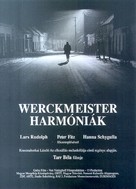Reviews provided by RottenTomatoes
Michael Wilmington, Chicago Tribune: An unabashed art film of real daring and power. Read more
Kevin Thomas, Los Angeles Times: As wearying as the film becomes in its long, bleak sequences, its uniquely cinematic and emotion-charged experience makes the effort worthwhile. Read more
Lawrence Van Gelder, New York Times: Mysterious, poetic and allusive. Read more
V.A. Musetto, New York Post: Rudolph is superb as the film's taciturn protagonist. Read more
Jonathan Rosenbaum, Chicago Reader: A chilling, mesmerizing, intense account of ethnic cleansing (in spirit if not in letter) from Hungarian master Bela Tarr. Read more
Noel Murray, AV Club: Over two hours and 20 minutes, not much actually happens, and Tarr creates a mood so lulling that even the rare scenes of dialogue can be hard to follow. But Werckmeister's standout moments are searing like few others in film history. Read more
Roger Ebert, Chicago Sun-Times: Bela Tarr's style seems to be an attempt to regard his characters with great intensity and respect, to observe them without jostling them, to follow unobtrusively as they move through their worlds, which look so ordinary and are so awesome, like ours. Read more
Edward Guthmann, San Francisco Chronicle: Using long takes, sensuous camera movements and the mournful beauty of Mihaly Vig's score, Tarr offers in Werckmeister Harmonies an indelible statement on loneliness and spiritual thirst. Read more
Derek Elley, Variety: Six years after the 7-1/2-hour Satan's Tango, Magyar maverick Bela Tarr makes a stunning feature return with "Werckmeister Harmonies," another hypnotic meditation on popular demagogy and mental manipulation that's a snap at 145 minutes. Read more
J. Hoberman, Village Voice: A totally sustained immersion in the magisterially bleak, voluptuously monochromatic, undeniably beautiful universe of muddy villages and cell-like rooms. Read more

